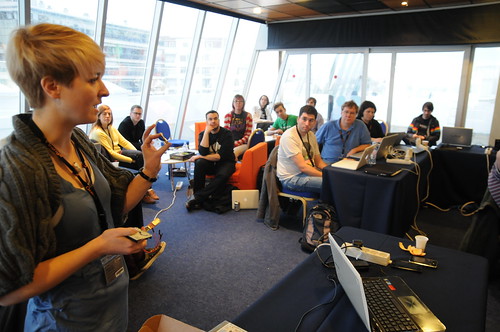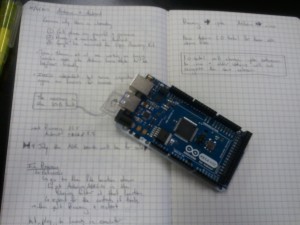This past weekend I participated in a Music Hack Day-esque event. It’s not quite a regular hack day as it is not an open invitation – you have to apply and have attended a hack day before. It’s because it’s a higher pressure event and you’re expected to output a quality hack with a good demo by the end of it for the music business conference attendees. The hack day is also much smaller – 30 people instead of 100+. The result was that it was easier to meet the other hackers and the demonstrations went just amazingly well. Everyone was well spoken and gave a clean demo.

Photo by Thomas Bonte
I worked with Suzie Blackman to produce Badgify. It was an Arduino and Android hack inspired by an Internet of Things approach. There are many ways to broadcast what you are listening to: Spotify, Last.fm, Facebook, This Is My Jam, and so on. But all of those services require online connectivity for others to learn what music you are listening to. Our hack lets you share what you are listening to with others in the same physical space as you. Using Bluetooth, your Android phone can communicate with a LCD screen “badge” that you can pin on your coat or bag. It displays the artist you most recently listened to (and scrobbled to Last.fm).
Below is the video of our presentation and a video of the badge and app in action. Our presentation is about 37 minutes in.
The hacks have also picked up a little bit of press.
I’m really glad I attended. Last year’s event was the first MIDEM Hack Day and it was invite-only; there wasn’t an application process. I was vocal in my disappointment in conducting an event this way and was happy that an open application process was adopted for this year. I wholeheartedly encourage you to apply next year.
